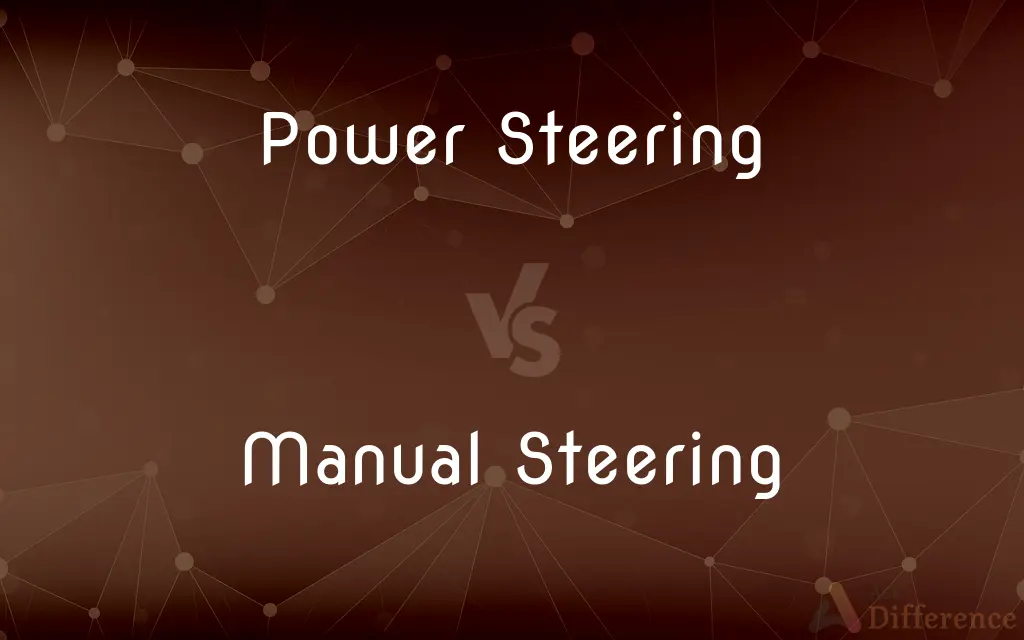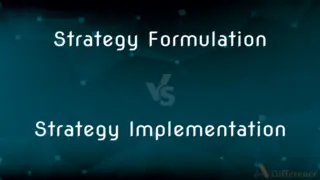Power Steering vs. Manual Steering — What's the Difference?
By Tayyaba Rehman — Published on October 20, 2023
Power Steering uses hydraulic or electric systems to aid steering, requiring less effort, while Manual Steering relies solely on the driver's physical input without assistance.

Difference Between Power Steering and Manual Steering
Table of Contents
ADVERTISEMENT
Key Differences
Power Steering employs a hydraulic or electric system that assists the driver in steering the vehicle, minimizing the effort required to turn the wheels. On the other hand, Manual Steering necessitates that the driver exert more physical effort, as it provides no assistance and fully relies on the driver's input.
When discussing Power Steering, it's crucial to acknowledge the ease it brings to handling a vehicle, especially during low-speed maneuvers like parking. Conversely, Manual Steering, while being harder to operate in such scenarios, often gives a more direct and tactile feedback from the road, providing a sense of control and purity that driving enthusiasts may seek.
Durability and maintenance are key differences between Power Steering and Manual Steering. Power systems may require more maintenance and are potentially more prone to failures due to their complex build. In stark contrast, Manual systems tend to be more durable and require less maintenance due to their simpler, more straightforward design.
From an energy efficiency perspective, Power Steering often consumes more energy than Manual Steering, especially hydraulic systems that draw power continuously. Manual Steering, without the need for extra power to assist the steering mechanism, may, therefore, be considered more energy-efficient.
Comparison Chart
Effort Required
Less physical effort is required.
More physical effort is needed.
ADVERTISEMENT
Complexity
Involves complex hydraulic/electric systems.
Simple, direct mechanical linkage.
Feedback
May dampen road feedback.
Provides direct, tactile road feedback.
Maintenance
Can require more frequent maintenance.
Tends to need less maintenance.
Energy Use
Consumes more energy (especially hydraulic systems).
Does not consume additional energy.
Compare with Definitions
Power Steering
A steering mechanism in vehicles that uses hydraulic or electric power to assist the driver.
The power steering in her car made parallel parking notably easier.
Manual Steering
Manual steering systems are often lighter due to the absence of additional components.
The reduced weight due to manual steering provides a performance advantage in certain racing contexts.
Power Steering
Power steering employs hydraulic or electric systems to provide steering assistance.
When the car is off, you can feel a significant difference because the power steering is not active.
Manual Steering
Manual steering involves direct mechanical linkage to control vehicle direction.
Driving a car with manual steering offers a more connected feel to the road.
Power Steering
Power steering reduces the physical exertion required to steer the vehicle.
Power steering is particularly beneficial when parking as it requires less muscle.
Manual Steering
A system that requires direct physical input from the driver to turn the vehicle.
Driving with manual steering provided him a raw and connected feel of the road.
Power Steering
Power steering assists drivers by using energy from the engine to ease the wheel-turning effort.
His car's power steering allows him to navigate turns with minimal effort.
Manual Steering
Manual steering offers a direct and unassisted relationship between the steering wheel and the tires.
Off-road enthusiasts sometimes prefer manual steering for its straightforward, tactile feedback on uneven terrains.
Power Steering
A feature that allows drivers to steer cars with decreased physical exertion.
Without power steering, turning the heavy truck would have been a challenging task.
Manual Steering
Manual steering requires more physical effort, especially at lower speeds.
Parallel parking with manual steering can be a workout, especially in tight spots.
Power Steering
Power steering adjusts the steering input based on the speed of the vehicle.
The power steering technology enables smoother handling at both high and low speeds.
Manual Steering
Manual steering tends to be more durable and requires less maintenance than power steering.
Many classic cars feature manual steering and remain functional with minimal upkeep.
Power Steering
Power steering can sometimes involve adaptive features to alter steering characteristics.
The advanced power steering in some vehicles allows for adjustments in steering sensitivity.
Manual Steering
A straightforward steering mechanism without assisted technologies.
Vintage cars usually come with manual steering, giving a nostalgic driving experience.
Common Curiosities
Does manual steering improve fuel efficiency?
Yes, since manual steering doesn’t utilize additional power for assistance, it may marginally improve fuel efficiency.
What makes power steering easier to operate?
Power steering uses hydraulic or electric assistance to reduce the effort needed to turn the wheels.
Is manual steering more common in certain types of vehicles?
Manual steering is often found in classic, vintage, or certain sports cars valuing direct feedback.
Why might someone prefer manual steering to power steering?
Enthusiasts might prefer manual steering for its direct road feedback and greater control.
Is one system more reliable than the other between power and manual steering?
Manual steering is often more reliable due to its mechanical simplicity and fewer components that can fail.
How does power steering enhance driver comfort?
Power steering reduces physical effort, especially in slow-speed maneuvers and turns, improving comfort.
Can power steering be added to a vehicle with manual steering?
Yes, it is possible with a conversion kit, though the process can be complex and costly.
How can one recognize a problem with power steering?
Difficulty in steering, unusual noises during turns, and steering wheel vibrations can indicate power steering issues.
Are there different types of power steering systems?
Yes, there are primarily hydraulic power steering (HPS) and electric power steering (EPS) systems, each with unique mechanisms and benefits.
How is manual steering typically adjusted or repaired?
Adjustments might involve aligning the wheels, checking the steering linkage, or lubricating the system for smooth operation.
How does temperature affect power steering and manual steering?
Cold can thicken power steering fluid, making it less efficient, while manual steering is less influenced by temperature changes.
Is power steering safer than manual steering?
Not necessarily. While power steering aids in ease of use, manual steering might offer better vehicle control in certain scenarios.
Does manual steering offer better performance in any scenarios?
Yes, some drivers prefer manual steering in performance driving for its direct feedback and undiluted control.
What is the maintenance difference between power and manual steering?
Power steering often requires more maintenance (fluid checks, pump inspections) than manual steering due to its complexity.
Can power steering fluid leak and what are its implications?
Yes, leaks can happen and might lead to harder steering and potential damage to the power steering pump.
Share Your Discovery

Previous Comparison
Address Bus vs. Data Bus
Next Comparison
Strategy Formulation vs. Strategy ImplementationAuthor Spotlight
Written by
Tayyaba RehmanTayyaba Rehman is a distinguished writer, currently serving as a primary contributor to askdifference.com. As a researcher in semantics and etymology, Tayyaba's passion for the complexity of languages and their distinctions has found a perfect home on the platform. Tayyaba delves into the intricacies of language, distinguishing between commonly confused words and phrases, thereby providing clarity for readers worldwide.
















































